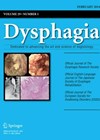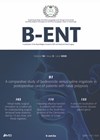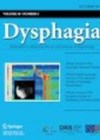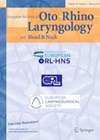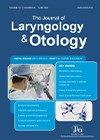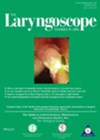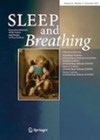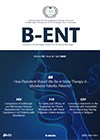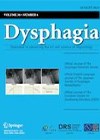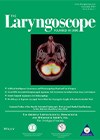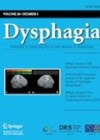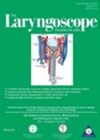
Journal Reviews
Analysing videofluroscopy: does it matter how it’s done?
Videofluoroscopy, as a tool that assesses the process of swallowing, has transformed our understanding of dysphagia. Clinicians can observe the biomechanics of a bolus moving from the oral cavity through the pharynx and oesophagus and into the stomach. Over the...
Factors associated with laryngopharyngeal reflux
This Chinese cross-sectional survey across three hospitals and 320 patients looked at the effect of unhealthy lifestyles and eating habits, as well as psychological difficulties, on the development of laryngopharyngeal reflux (LPR). All the participants underwent gastroscopy, laryngoscopy and various...
How common is self-reported dysphagia in the general population?
Healthcare policymakers and commissioners of services often review incidence and prevalence data when deciding on resource allocation. The authors of this paper have capitalised on a large dataset, the Canadian Longitudinal Study on Aging (CLSA), which collects data on over...
Metrics to evaluate post-ACDF dysphagia
The authors performed a literature review to evaluate the current classification metrics for quantifying dysphagia after anterior spine surgery and, specifically, cervical discectomy and fusion (ACDF). They selected 19 articles after reviewing literature from 2005 to 2021. The result of...
Infection and other factors influencing post-tonsillectomy haemorrhage
In this detailed narrative review article, the authors have addressed several factors which could be related to postoperative bleeding after tonsillectomy. As regards to microbiology, the significance of micro-organisms present both on surface and within the tonsils is emphasised and...
Choosing instrumental assessments of swallowing for children
Swallowing disorders in children are increasingly common due to advances in medical care allowing them to survive prematurity or complex health conditions. Careful assessment of eating and drinking is necessary to ensure that children are managed both safely and with...
Does pregabalin help with post-tonsillectomy pain?
This is a small double-blind randomised controlled trial conducted on tonsillectomy and lateral pharyngoplasty operations. Both of these operations are terrifically painful, and I am sure most of us are looking for a way of reducing the suffering for our...
Cervical tracheal reconstruction
This Chinese animal study looked at the use of a xenogenic acellular dermal matrix for tracheal reconstruction. The authors took a total of 22 rabbits and divided them into an experimental (repair with xenogenic acellular dermal matrix) and control group...
How well do different assessments of swallowing correlate with one another?
Swallowing (dys)function may be assessed by three key measures: 1. instrumental swallowing techniques such as the modified barium swallow (MBS) or videofluoroscopy; 2. functional measures of diet texture that patients can eat comfortably (usually rated by the clinician); and 3....
How does temporomandibular dysfunction affect voice-related quality of life?
Temporomandibular dysfunction (TMD) is a group of neuromuscular or musculoskeletal problems that affect the muscles and fascia related to chewing and jaw opening. Patients are often seen in ENT clinics because of symptoms such as trismus, pain and muscle tension,...
Does the appearance, texture, and flavour of food affect how we swallow?
Texture modification and the use of thickened fluids are well-known strategies used to facilitate swallowing in people with dysphagia. However, some controversy exists around thickeners and their possible negative impact on hydration and medication absorption. This paper considers other properties...
What is the quality of patient-reported outcomes of salivary function?
Salivary gland dysfunction has multiple causes and can have significant impact on quality of life, particularly when symptoms are severe. There are several patient-reported outcomes (PROMS) that assess these issues; however, these are variable in what they measure. This systematic...

